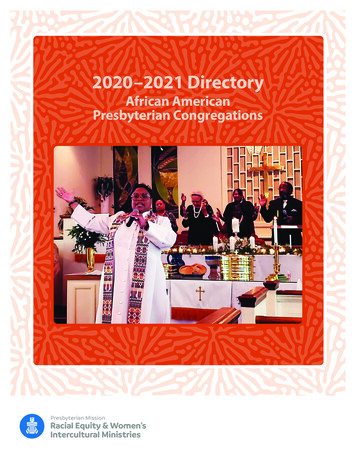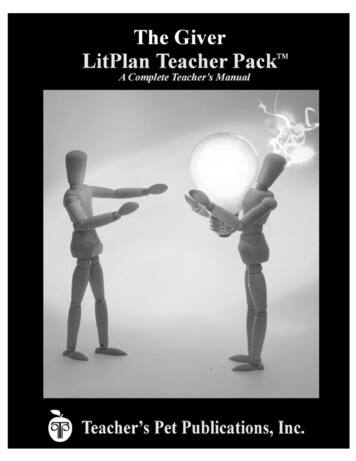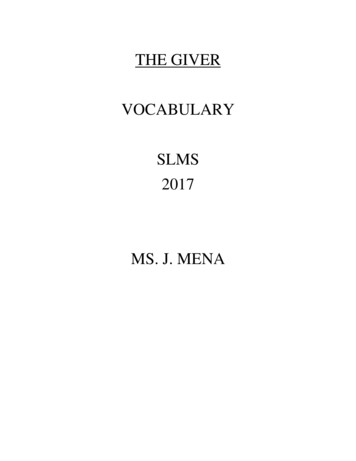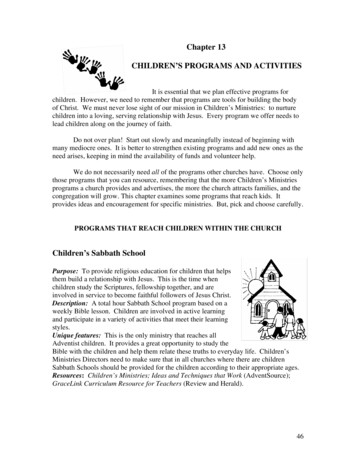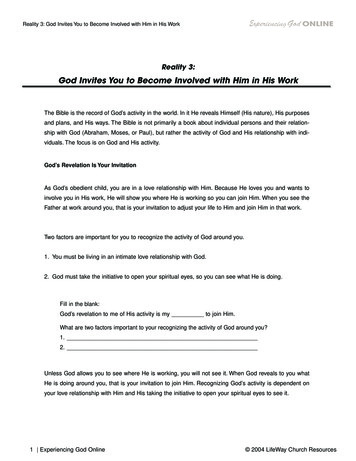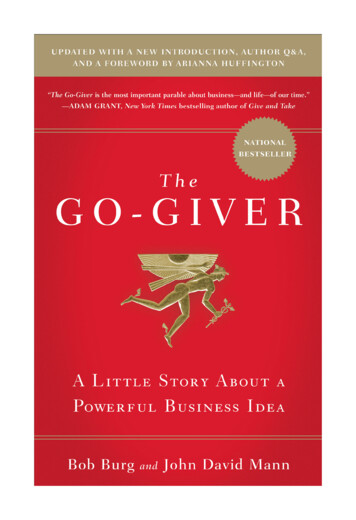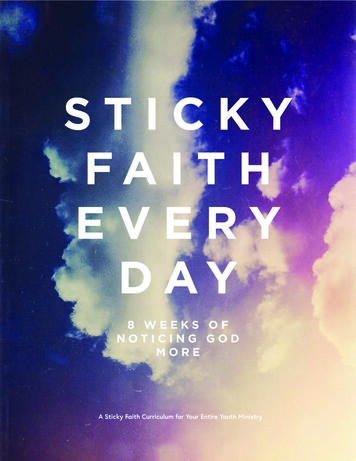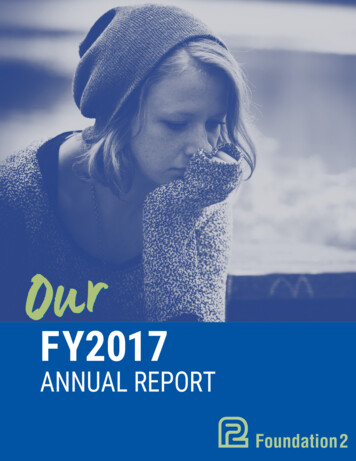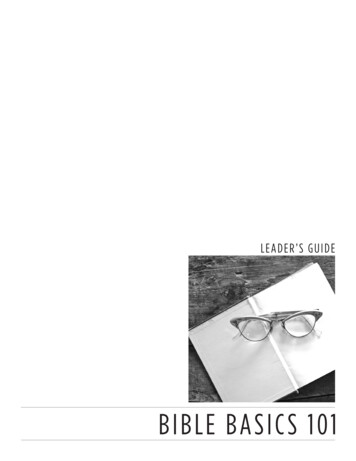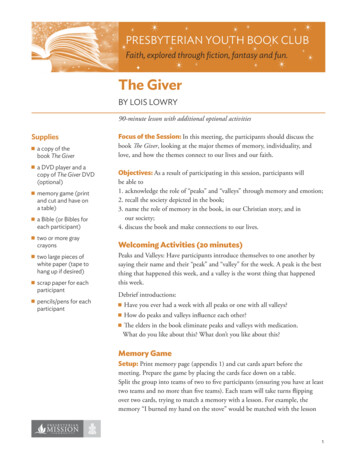
Transcription
PRESBYTERIAN YOUTH BOOK CLUBFaith, explored through fiction, fantasy and fun.The GiverBY LOIS LOWRY90-minute lesson with additional optional activitiesSuppliesgggggggg a copy of thebook The Giver a DVD player and acopy of The Giver DVD(optional)Focus of the Session: In this meeting, the participants should discuss thebook The Giver, looking at the major themes of memory, individuality, andlove, and how the themes connect to our lives and our faith. a Bible (or Bibles foreach participant)Objectives: As a result of participating in this session, participants willbe able to1. acknowledge the role of “peaks” and “valleys” through memory and emotion;2. recall the society depicted in the book;3. name the role of memory in the book, in our Christian story, and inour society;4. discuss the book and make connections to our lives. t wo or more graycrayonsWelcoming Activities (20 minutes) m emory game (printand cut and have ona table) t wo large pieces ofwhite paper (tape tohang up if desired) s crap paper for eachparticipant p encils/pens for eachparticipantPeaks and Valleys: Have participants introduce themselves to one another bysaying their name and their “peak” and “valley” for the week. A peak is the bestthing that happened this week, and a valley is the worst thing that happenedthis week.Debrief introductions:g Have you ever had a week with all peaks or one with all valleys?g How do peaks and valleys influence each other?g The elders in the book eliminate peaks and valleys with medication.What do you like about this? What don’t you like about this?Memory GameSetup: Print memory page (appendix 1) and cut cards apart before themeeting. Prepare the game by placing the cards face down on a table.Split the group into teams of two to five participants (ensuring you have at leasttwo teams and no more than five teams). Each team will take turns flippingover two cards, trying to match a memory with a lesson. For example, thememory “I burned my hand on the stove” would be matched with the lesson1
“stoves are hot and not to be touched when on.” If they find a match, the teamgets a second turn. If they don’t find a match, then it’s the next team’s turn.Repeat until all cards are uncovered.Debrief the game:g How do memories influence our life?g In the book, how would memories benefit the society?g How would memories break down the society?g What is important about memories and history in a society?Book Review (10 minutes)Split the participants into two groups. Have them, using only a gray crayon,doodle and/or write words or phrases on large pieces of white paper abouthow they remember the society from the book. If they need help rememberingthe community, give key words as clues (elders, assigned jobs, rules, released,caretakers, nurturer, pills, etc.). Share drawings and society descriptions.Book Discussion on Theme of Memory (20 minutes)Read the quote about receiving memories on page 78: “There’s much more.There’s all that goes beyond—all that is Elsewhere—and all that goes back, andback, and back. I received all of those, when I was selected. And here in thisroom, all alone, I re-experience them again and again. It is how wisdom comes.And how we shape our future. . . . I am so weighted with them.”1 Choose a fewof the following questions to help discuss the theme of memory:g Think back to a memory that may have been a valley for you. How wouldyour life be changed without this memory? How can this memory weigh youdown? Can memories of negative times weigh us down so much that theydon’t allow us to experience good?g Think back to a memory that was a peak for you, a memory that evokes loveand joy. How would your life be changed without this memory? Can onegood experience leave us with such a good memory that we find it difficult toexperience anything less?g Why do the elders believe that access to memories is dangerous?g How can memories of good and bad allow us to shape our future?g Thinking about distant memories, why is it important to share stories? Inthe book, the community only has their generation of memories. Is therea benefit or drawback from having fewer memories? How is story sharingimportant to your family or friend group? Do you have that one family storyeveryone talks about? What does that story say about your family?g As the Giver releases the painful memory of an elephant being killed and itstusk taken, he shares the sound made by a grieving elephant. “Jonas had never1. Lois Lowry, The Giver (New York, NY: Bantam Doubleday Dell Publishing Group, 1994),144.2
heard such a sound. It was a sound of rage and grief and it seemed never toend.”2 Why is this an important memory to be shared with Jonas? Why is thisan important memory for people today? How would life be different for us ifwe had no knowledge of the evils people commit? Do you think this is whybooks are banned in the community? Explain.g On page 123, the Giver shares his favorite memory with Jonas. It is amemory of Christmas. This memory teaches Jonas about words he neverknew existed: warmth, happiness, family, grandparents, and love. Can memoriesteach us new things? How can memories teach us to look at situations withdifferent perspectives?g Pages 133–34 tell of the children playing a game of good guys vs. bad guys.This game triggers memories of war for Jonas. Jonas tells his friends that it isa cruel game. How is his new understanding and empathy from the memoriesturning him into an outcast with others in the community? How is itchanging how he interacts with others?Connecting the Theme of Memory to the Bible(15 minutes)Look at how a story and memory is recalled throughout our Christian story:g Explain that Passover was the 10th plague in Egypt against Pharaoh andhis people. This event allowed Moses to lead the Israelites to freedom fromslavery. Read our story from Exodus 12:11–14, which follows the instructionsof how to prepare the lamb and bread for the Passover meal. What does this story say about memory?g Passover is still an important tradition and story recalled in Judaism today.The disciples also shared in this story with Jesus during the Last Supper,which was a celebration of the Passover meal. Read our story from Matthew26:17–19, 26–30. What words were spoken and actions completed as part of the LastSupper celebration? What connection does this story have with the Passover story? How is this story changed and made into a new story?g After Jesus died and ascended into heaven, the disciples and followers of Jesusare left to be the church, after they receive the gift of the Holy Spirit. Thebook of Acts is about their first acts to build the church. Read Acts 2:42–47. How did the community continue the story? How do we continue being part of this Christian memory and story? What would our faith look like without these memories? How is memory vital to our faith?2. Ibid., 100.3
Book Discussion on Theme of Sameness (15 minutes)Read the quote about sameness on page 94: “There was a time, actually—you’llsee this in the memories later—when flesh was many different colors. That wasbefore we went to Sameness. Today flesh is all the same. . . . We relinquishedcolor when we relinquished sunshine and did away with differences. . . . Wegained control of many things. But we had to let go of others.”3 Choose a fewof the following questions to help discuss the concept of individuality andsameness:g The elders in the community have decided that sameness benefits everyone.What are the pros and cons of sameness—in people, weather, landscape,food, etc.? Describe what life would be like without variety.ggg Recall the different ceremonies that take place at each age (a bicycle at agenine, a haircut at age 10, assignments at age 12). How do we mark differentmilestones in our society? What happens at age 11? 13? 16? How do thesecelebrations mark our maturity as individuals and a community? In the book, who decides on job assignments? How would life be differentin the community if people could choose their own assignment? How doestheir experience of being assigned a job compare with the way we choose ourprofessions? Would you prefer for someone to decide your job for you?Why or why not? Why did Jonas stop taking his pill each morning? How did this change hisdepth of feeling and his understanding of what others were, or perceived tobe, feeling?gg After discovering how people are released, Jonas decides to save Gabe’slife by running away with him. When their supplies dwindled, they beginto experience hunger and fear as well as awe at new animals. How dothese feelings differ from life in the community, with its sameness andpredictability? The community in the book discourages individualism and promotessameness. On page 121, the Giver shares the memory of a birthday party.This memory allows Jonas to understand the joy of being an individual.Take a few moments to contemplate the importance of being the individualsGod created us to be. After each question, there will be a time for reflection.Doodle your response to the question, or think about your answer: What excites you or brings joy in your life? How do you make time to experience this excitement or joy? How do these things that bring you joy and excitement shapewho you are?g “They have never known pain, he thought. The realization made him feeldesperately lonely.”4 Sharing in one another’s pains and joys can connect us.3. Ibid., 94.4. Ibid., 110.4
Theologian Dietrich Bonhoeffer describes this as place sharing, meaning“to suffer with” and “stand in” for others. How can place sharing not onlyhelp us to stay connected but allow us to empathize with others and thereforeshow compassion?Closing Activity (10 minutes)Revisit the conversation between Jonas and the Giver about the memory of thefamily at Christmas: “The family in the memory seemed a little more—’ He faltered,not able to find the word he wanted. “A little more complete,” The Giver suggested.Jonas nodded. “I like the feeling of love,” he confessed.5g On page 127, Jonas asks his parents if they love him. They caution him tonot use vague and meaningless words like love. Can love be broken down intoenjoyment and pride, like Jonas’s parents suggest?g In the community, is there an absence of love? Can there be an absence oflove in our relationships? Describe relationships that have love as well asrelationships that don’t have love. How do they differ? Does love complete us?g On a piece of paper, write the word LOVE in the middle and circle it. Drawlines or branches from the circle, and write the names of people with whomyou are in relationships where love is present. Circle their names. Drawlines or branches extending from those circles, and write down the qualitiesthat are present in those relationships—laughter, common interests, family,trust, honesty, respect, shared experiences, or pride, for example. Allowtime for each participant to share a few qualities that are present in theirloving relationships. Give thanks to God for allowing love to reside in ourcommunity and in our lives.Closing PrayerGod of the past, present, and all times,Help us continue to strive to live as people of hope. Help us to feel yourpresence in our peaks and in our valleys. You are a God that walks with us, eatswith us, and is present in our lives, and we thank you. Amen.Additional Activitiesgg Watch the movie The Giver either before or after the session. Discuss andcompare the book and movie. The community in the book is marked by grayness and colorlessness in theirsameness. Think of a service project that gives color back to your community,and do it together. One idea would be to do a book drive or literacy serviceproject.5. Ibid., 126.5
Appendix 1Memory:I burned myhand on thestove.Lesson:Stoves are hotand not tobe touchedwhen on.Memory:I tripped onthe side walk.Lesson:Look forcracks on thesidewalk.Memory:Cheese makesme really sick.Lesson:I am lactoseintolerant.Memory:I get cake onmy birthday.Lesson:Save roomafter dinnerfor cake on mybirthday.Memory:I studied alot for a testand didn’t dofun thingsone night.Lesson:I made agreat gradeon my test bystudying.Memory:My siblingtook me to themovies.Lesson:My sibling andI can have funtogether.Memory:I lied to aparent and gotin big trouble.Lesson:Don’t lie toyour parents.Memory:I teased a girlabout her shirtand she cried.Lesson:Teasing makesother peoplesad.Memory:I was frustratedand slammedmy laptop shut,breaking it.Lesson:Frustrationexpressedon items canbreak them.Memory:We sang myfavorite song,“Silent Night,”at ChristmasEve worship.Lesson:I enjoy goingto worshipChristmas Eveto sing.Memory:Sledding onbig, open hillswas fun andexciting.Lesson:I like the thrillof sledding.Memory:I won a soccertournamentwith my team.Lesson:I like playingsports ona team andtrying to win.Memory:This boy madefun of myshoes.Lesson:Stay away fromthe boy thatmakes fun ofme.Memory:A dog bit me.Lesson:Be cautiouswhenapproachingdogs.Memory:I egged a carwith friendsand felt sonervous.Lesson:Breaking rulesmakes menervous.Memory:My friends andI always getpopcorn at themovies.Lesson:Movies arebetter withpopcorn.Memory:I pulled out ofmy drivewaywithoutlooking andalmost got hit.Lesson:Look bothways whenpulling out ofmy driveway.Memory:I held handswith someoneI liked at themall.Lesson:It feels niceto hold handswith significantothers.6
1 The Giver BY LOIS LOWRY Supplies g a copy of the book The Giver g a DVD player and a copy of The Giver DVD (optional) g memory game (print and cut and have on a table) g a Bible (or Bibles for each participant) g two or more gray crayons g two
